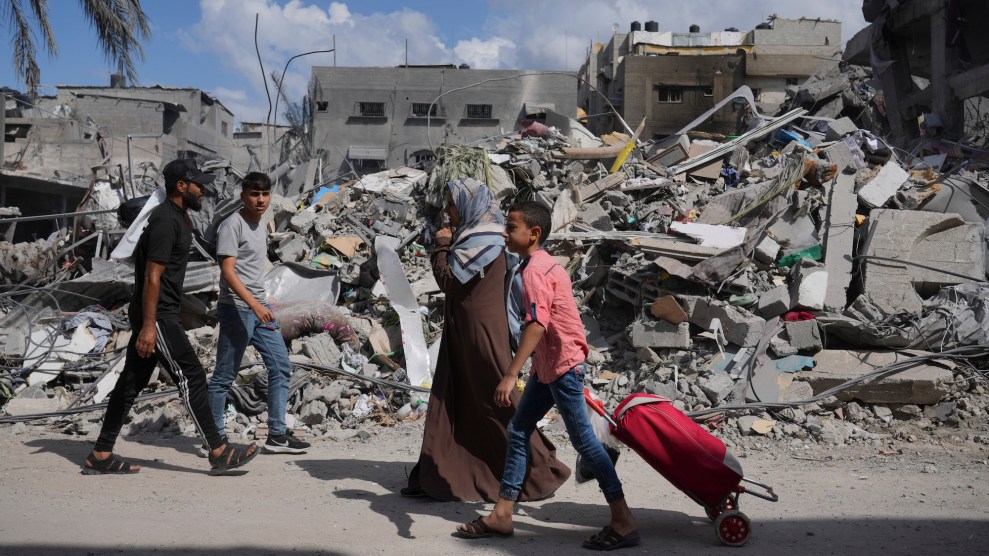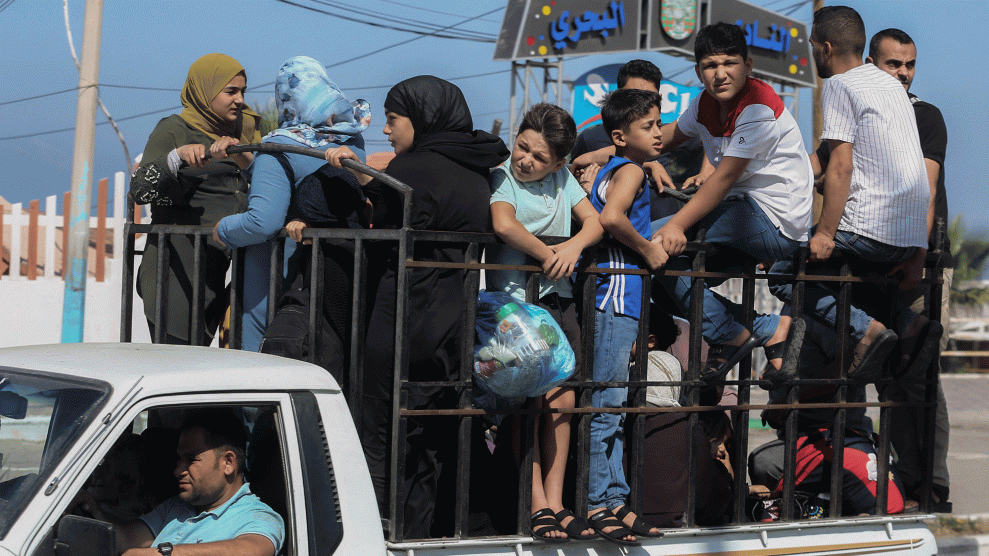
Palestinians walk next to the buildings destroyed in Israeli airstrikes in Bureij refugee camp in Gaza on Wednesday.Hatem Moussa/AP
Last week, a BBC anchor asked former Israeli peace negotiator Daniel Levy about Israel’s rationale for its devastating siege on Gaza, saying that the “Israelis would say, well look, we are defending ourselves.” Levy’s response quickly went viral.
“Do you really keep a straight face when you say that?” he asked. “Do you think terrorist organizations embedded in populations who are denied their most basic rights are ended once and for all in a military campaign? Does that happen in history?”
BBC Presenter: "The Israelis would say, well look, we are defending ourselves, we are targeting Hamas targets in Gaza…"
Daniel Levy: "Do you really keep a straight face when you say that? … these kind of lies can be allowed to pass" pic.twitter.com/G7jKmLzlhR
— Saul Staniforth (@SaulStaniforth) October 11, 2023
Levy, who is based in London, is currently the president of the U.S./Middle East Project. He previously served as an Israeli peace negotiator during the Oslo B talks under Israeli Prime Minister Yitzhak Rabin and the Taba peace talks under Prime Minister Ehud Barak. Since the October 7 attack by Hamas, which claimed the lives of more than 1,300 people in Israel, Levy has been vocal about the response of the Israeli state and the death it is causing in Gaza.
In an op-ed published by the Irish Times last weekend, Levy and human rights lawyer Zaha Hassan stressed three points: Hamas’ attack on Israeli civilians was unconscionable; Israel’s collective punishment of people in Gaza—notably the cutting off of water, food, and electricity—was as well; and that “one must address the context of occupation and apartheid in which this is unfolding.” Without that broader view, they wrote it is not possible “to maintain integrity and be able to plot a strategy going forward in which both Palestinians and Israelis can live in freedom and security.”
Levy and I spoke on Monday evening just before it was confirmed that President Joe Biden would be visiting Israel on Wednesday. The interview has been edited for length and clarity.
You said last week that it looked like Israel was committing premeditated war crimes. Where do you stand on that now?
I’ve simply tried to point out something that should be very simple: One war crime is not met by another. That’s the path to hell, which is precisely the path we’re on now.
Especially at a moment like this, where emotions are so raw, and understandably so, where the temptation is to lash out in all directions, and throw every rulebook and every restriction out the window, doing so is not only going to cause a devastating impact on civilian lives on the Palestinian side—after the already devastating impact on Israeli civilian lives—but it can also take you down such a dangerous, unpredictable, and escalatory path. War is horrific. That’s why there are rules that govern the conduct of war. But even when you play within those rules it’s still horrific.
If you want to take seriously the idea that no one who is a civilian should be targeted without distinction, then you cannot be indifferent to something that is premeditated in targeting civilians in Gaza. There’s an argument that says: Hamas started this, Hamas embeds itself amongst the population, so anything that happens to the Palestinians of Gaza will be laid at Hamas’ door. You cannot cut off water, food, fuel, electricity, medical supplies, humanitarian systems, bomb pretty much indiscriminately, force the relocation of half the civilians in Gaza and say that’s OK. It’s patently not.
The second thing is that in a moment that is so raw, so escalatory, you need responsible adults because the path to the level of dehumanization that is the descent into absolute hell is so much shorter. What you want from the outside is a response which wraps its arms around everyone and reminds us where this can’t go.
Anything that contributed and continues to contribute to the dehumanizing of Palestinians at this moment is at a minimum a sin of omission. It’s not that Biden or other American leaders got up and said—I echo the call of the Israeli president and there’s no distinction between civilians and combatants, or I echo the defense minister who called the people in Gaza beasts. It’s not that the American leadership said those things, but by not empathizing with the situation of the civilians in Gaza, which became dreadful and devastating very quickly, American political leaders were feeding into a discourse. I have spoken to people back in Israel and I hoped they would correct my impression, but sadly it was vindicated—and we are hearing the kind of discourse of Rwanda and the Western Balkans in the 1990s.
How much power do you think the US has to prevent Israel from causing more death and suffering in Gaza than it already has?
I am still going with considerable power, which becomes very difficult to apply if you shackle yourself politically. Clearly, Israel is set on doing something unprecedented. I’m not sure it has a detailed playbook. I think there are several playbooks out there.
But if you look at the factors that are the building blocks of this moment. You’ve got the need to respond, to assert deterrence, those kinds of things. You have some additional factors, which given the scale of what happened, take us to a potentially totally new place.
One factor is the unprecedented unity in Israel around this, up against the backdrop of what was the most politicized political climate in Israel ever before October 7th. It’s hard to imagine there will ever be a public atmosphere that is willing to make sacrifices—doing your reserve duty for an indefinite period of time, not having kids at school, being in shelters, etc. That’s one factor.
A second factor is that I think the prime minister is absolutely terrified of the morning after. Right now, Netanyahu doesn’t have to deal with commissions of inquiry. Everyone has parked the “what went wrong October 7th” question. It’s a fool’s errand to eulogize Netanyahu politically, but I don’t see how he wriggles out of this.
I think it’s not unreasonable to speculate that Netayanhu looks at this interregnum as a last roll of the dice. If he doesn’t pull something out of the hat, he goes down in history as the prime minister who was in court facing criminal charges, but stayed on in the prime minister’s office, was asleep on the watch, and presided over the greatest disaster in Israeli history. That right now is his political obituary. Netanyahu was a quite risk-averse political leader militarily in surprising respects—which didn’t mean that he didn’t do terrible things to avoid any peace or any progress or to create circumstances where an explosion was unlikely. I think that Netanyahu is gone. Nothing is yet ruled out, including broadening this war to Hezbollah.
The third factor is the unprecedented external backing. I do think that if America says no, it will be hard for Israel to continue to pursue this.
Given the leverage the United States has, what do you make of what Biden has done and said so far?
In May of 2021 there was an escalation with Gaza. Palestinians have called it the Unity Intifada. There were major mobilizations in the West Bank, as well as events that happened inside Israel itself. Mutual acts of violence. I think the administration looks back at that and thinks they wrapped their arms around Netanyahu and that they dialed it down relatively quickly and they feel they deserve more than a passing grade for that.
Now, the US administration know that this is not a repeat of 2021. But I think the broad parameters are being followed in as much as you wrap your arms around the Israelis and that gives you greater purchase. However, that sin of omission initially fed into extremely dangerous discourse. If it doesn’t dial down, the US could be responsible for early on helping to nudge it in a direction where we reach a point of no return.
The other thing is the moving of US military assets into the region. I think to the US the intention is to send a deterrent signal to other external actors—primarily Hezbollah and Iran—and signal to Israel and say, see, we don’t have to expand the arena.
That can be interpreted a different way if Israel is considering that this is the moment to not only try to change the equation on the Palestinian front, but to do so vis-a-vis Hezbollah. America being there gives Israel the option of interpreting that now we have more cover to act on that front because if we do, and Hezbollah sends rockets into Israel, America will have to directly react.
The political reality that has been created in America, whereby this is 9/11 and the Holocaust combined—that is the terminology being used—that means that if the US has that warship sitting there, they will bloody well use it. And that may well encourage Israel up the ladder.
The other thing to factor in is that Netanyahu has even been on record in the past as saying: I know how to play the Americans. There is a direct correlation between how bad this gets in Gaza and how likely it is to expand and escalate elsewhere.
I think America is now saying quietly to Israel: This is going to be terrible for you, terrible for everyone, we’re losing support, the region is not happy, we’ve got to keep this in parameters.
And Bibi responds by saying: You said we had the right; we now have to do X, Y, Z.
The only way the US may be able to actually assert that influence on Israel will be to assert it publicly directly against Bibi. And I don’t think the administration wants to go there. And it may be that if the Israelis don’t want to do what you’re saying and you’re not willing to say it in public, then you have a real problem. And that’s where we might be headed.
Stepping back from the present, the United States has supported Israel for decades as it has created facts on the ground that make an end to the occupation and the chances of a Palestinian state increasingly remote. How did that largely unconditional support contribute to the root causes of the violence now?
I think that American indulgence has done a terrible disservice to Israeli public choices and Israeli political decision-making. I would certainly draw a causal line from there to the hubris and the dismissive way that Israel has dealt with the Palestinian issue.
By allowing Israel to believe that this could be managed so easily at so little cost because whatever you do America would have your back—that America would guarantee that there were no consequences—it was about the worst thing America could have done. And I don’t think we could be in a world in which Itamar Ben-Gvir and Bezalel Smotrich and their extremism have become so mainstream without America guaranteeing Israeli impunity.
The kind of nonchalance that contributed to the systemic failure and the deep corrosion in parts of the Israeli system also result from that. I’m not suggesting that Israel could be easily bludgeoned and sanctioned into getting out of the territories. But in the quarter century since the peace process really started going off a cliff, you would have had a different Israeli public conversation if the US had not pursued this indulgent line.

















